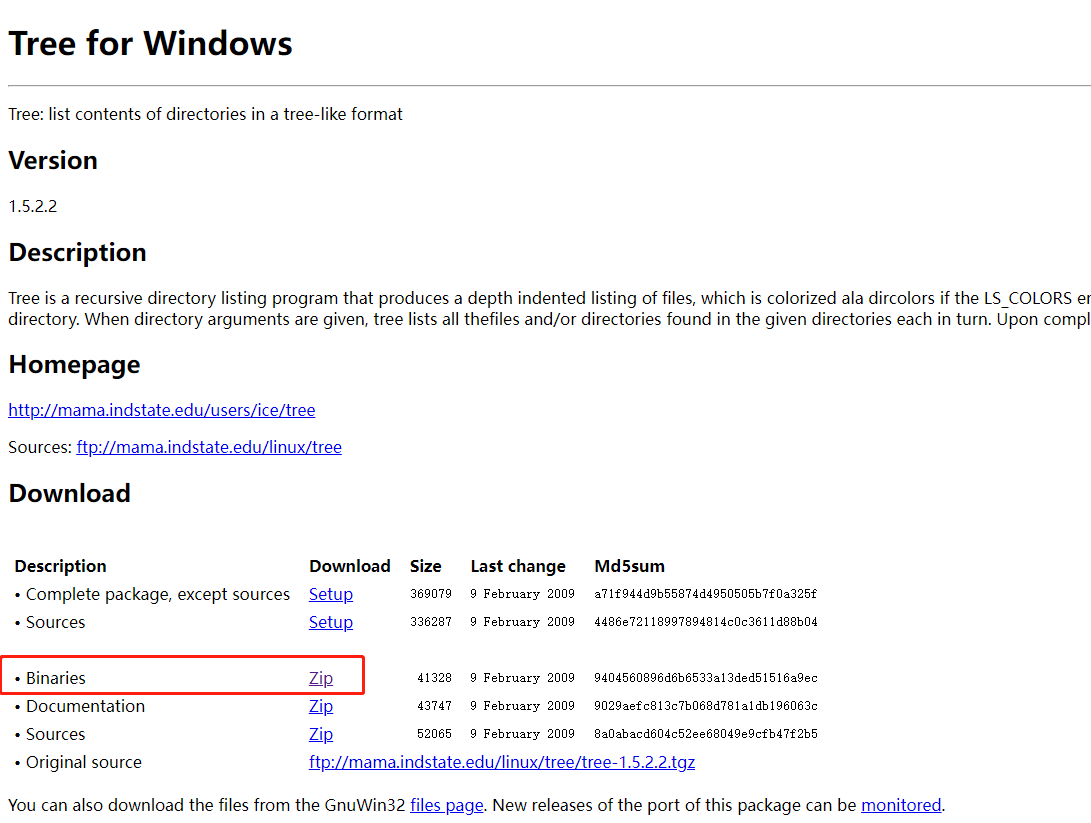参考文档:https://www.anspoon.com/tree-command-generate-directory-structure-1701.html
语法:
TREE [drive:][path] [/F] [/A]
| 参数 | 描述 |
|---|---|
| drive: | 指定包含要为其显示目录结构的磁盘的驱动器 |
| path | 指定要为其显示目录结构的目录 |
| /F | 显示每个目录中文件的名称 |
| /A | 指定树将使用文本字符而不是图形字符来显示链接子目录的行 |
| /? | 在命令提示符下显示帮助 |
git 使用 tree命令
Git 使用 tree 命令可以忽略一些目录,扩展系统 tree 命令
[
](http://gnuwin32.sourceforge.net/packages/tree.htm)
- 先下载一个压缩包 http://gnuwin32.sourceforge.net/packages/tree.htm,下载 binaries 对应的 zip

- 下载完成,解压后打开 bin 目录

把 tree.exe 复制到 git 安装目录下的 usr/bin 目录下
Git 下 tree 命令的使用
语法
tree(选项)(参数)
常用命令:
打印两层目录,不排序,忽略 node_modules文件夹,结果输出到 fileDirectory.txt 文件
tree -L 2 -I node_modules -U >>fileDirectory.txt
选项
------- 列表选项 --------a # 显示所有文件和目录。-d # 显示目录名称而非文件。-l # 如遇到性质为符号连接的目录,直接列出该连接所指向的原始目录。-f # 在每个文件或目录之前,显示完整的相对路径名称。-x # 将范围局限在现行的文件系统中,若指定目录下的某些子目录,其存放于另一个文件系统上,则将该目录予以排除在寻找范围外。-L level # 限制目录显示层级。-R # Rerun tree when max dir level reached.-P pattern # <范本样式> 只显示符合范本样式的文件和目录名称。-I pattern # Do not list files that match the given pattern.--ignore-case # Ignore case when pattern matching.--matchdirs # Include directory names in -P pattern matching.--noreport # Turn off file/directory count at end of tree listing.--charset X # Use charset X for terminal/HTML and indentation line output.--filelimit # # Do not descend dirs with more than # files in them.--timefmt <f> # Print and format time according to the format <f>.-o filename # Output to file instead of stdout.-------- 文件选项 ----------q # 用“?”号取代控制字符,列出文件和目录名称。-N # 直接列出文件和目录名称,包括控制字符。-Q # Quote filenames with double quotes.-p # 列出权限标示。-u # 列出文件或目录的拥有者名称,没有对应的名称时,则显示用户识别码。-g # 列出文件或目录的所属群组名称,没有对应的名称时,则显示群组识别码。-s # 列出文件和目录大小。-h # Print the size in a more human readable way.--si # Like -h, but use in SI units (powers of 1000).-D # 列出文件或目录的更改时间。-F # 在执行文件,目录,Socket,符号连接,管道名称名称,各自加上"*","/","@","|"号。--inodes # Print inode number of each file.--device # Print device ID number to which each file belongs.------- 排序选项 --------v # Sort files alphanumerically by version.-t # 用文件和目录的更改时间排序。-c # Sort files by last status change time.-U # Leave files unsorted.-r # Reverse the order of the sort.--dirsfirst # List directories before files (-U disables).--sort X # Select sort: name,version,size,mtime,ctime.------- 图形选项 -------i # 不以阶梯状列出文件和目录名称。-A # 使用ASNI绘图字符显示树状图而非以ASCII字符组合。-S # Print with CP437 (console) graphics indentation lines.-n # Turn colorization off always (-C overrides).-C # 在文件和目录清单加上色彩,便于区分各种类型。------- XML / HTML / JSON选项 --------X # Prints out an XML representation of the tree.-J # Prints out an JSON representation of the tree.-H baseHREF # Prints out HTML format with baseHREF as top directory.-T string # Replace the default HTML title and H1 header with string.--nolinks # Turn off hyperlinks in HTML output.---- 杂项选项 ------version # 输入版本信息。--help # 打印使用帮助信息。-- # Options processing terminator.
参数
目录:执行tree指令,它会列出指定目录下的所有文件,包括子目录里的文件。
实例
列出目录/private/ 第一级文件名
tree /private/ -L 1/private/├── etc├── tftpboot├── tmp└── var
忽略文件夹
tree -I node_modules # 忽略当前目录文件夹node_modulestree -P node_modules # 列出当前目录文件夹node_modules的目录结构tree -P node_modules -L 2 # 显示目录node_modules两层的目录树结构tree -L 2 > /home/www/tree.txt # 当前目录结果存到 tree.txt 文件中
忽略多个文件夹
tree -I 'node_modules|icon|font' -L 2
非树状结构列出目录/private/下的所有文件
tree -if /private//private/private/a1/private/a2/private/etc/private/etc/b1/private/etc/b2/private/tftpboot

